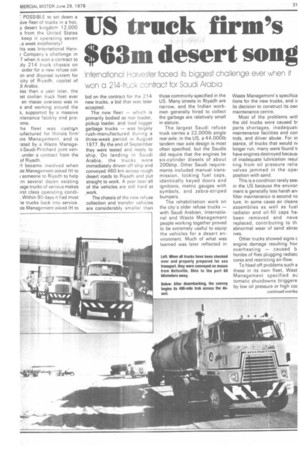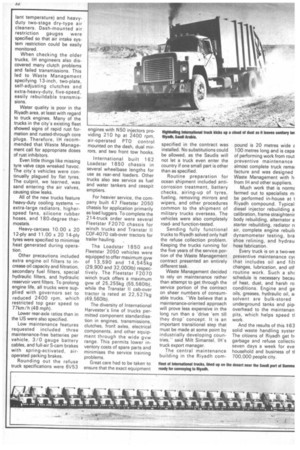US truck firm's 63m desert song
Page 33

Page 34

If you've noticed an error in this article please click here to report it so we can fix it.
International Harvester faced its biggest challenge ever when it won a 214-Tuck contract for Saudi Arabia
POSSIBLE to set down a -sive fleet of trucks in a hot, y desert kingdom 12,000 s from the United States keep it operating seven ; a week indefinitely?
his was International Naryr Company's challenge in 7 when it won a contract to ily 214 truck chassis on order for a new refuse colon and disposal system for city of Riyadh, capital of Ii Arabia.
ess than a year later, the st civilian truck fleet ever en masse overseas was in e and working around the k, supported by a massive ntenance facility and pronme.
he fleet was custgrn iufactured for Illinois firm' sle Management, and is rated by a Waste Manageit-Saudi-Pritchard joint venunder a contract from the of Riyadh.
H became involved when ;te Management asked IH to isomeone to Riyadh to help In several dozen existing )age trucks of various makes irst class operating condi. Within 90 days it had most Pe trucks back into service. ;te Management asked IH to bid on the contract for the 214 new trucks, a bid that was later accepted.
The new fleet — which is primarily bodied as rear loader, pickup loader, and load lugger garbage trucks — was largely rush-manufactured during a three-week period in August 1977. By the end of September they were tested and ready to ship. On landing in Saudi Arabia, the trucks were immediately driven off ship and convoyed 460 km across rough desert roads to Riyadh and put straight to work. A year later all of the vehicles are still hard at _work.
The chassis of the new refuse collection and transfer vehicles are considerably smaller than those commonly specified in the US. Many streets in Riyadh are narrow, and the Indian workmen generally hired to collect the garbage are relatively small in stature.
The largest Saudi refuse truck carries a 22,000lb single rear axle; in the US, a 44,000lb tandem rear axle design is most often specified, but the Saudis did require that the engines be six-cylinder diesels of about 200bhp. Other Saudi requirements included manual transmission, locking fuel caps, identically keyed doors and ignitions, metric gauges with symbols, and zebra-striped bumpers.
The rehabilitation work on the city's older refuse trucks — with Saudi Arabian, International and Waste Management people working together proved to be extremely useful to equip the vehicles for a desert environment. Much of what was learned was later reflected in Waste Management's specifica tions for the new trucks, and ir its decision to construct its owi maintenance centre.
Most of the problems witl the old trucks were caused 13, parts shortages, inadequati maintenance facilities and con trols, and driver abuse. For in stance, of trucks that would ni longer run, many were found ti have engines destroyed becausi of inadequate lubrication resul ting from oil pressure retie valves jammed in the opei position with sand.
This is a condition rarely seei in the US because the enviror ment is generally less harsh an filter maintenance is second nE tore. In some cases air cleane assemblies as well as fuel radiator and oil-fill caps hal been removed and neve replaced, contributing to th abnormal wear of sand abraE ives.
Other trucks showed signs c engine damage resulting fror overheating — caused b hordes of flies plugging radiatc cores and restricting air-flow.
To head off problems such a these in its own fleet, Wast Management specified au tomatic shutdowns (triggere by low oil pressure or high coc lant temperature) and heavyduty two-stage dry-type air cleaners. Dash-mounted air restriction gauges were specified so that air intake system restriction could be easily monitored.
When checking the older trucks, IH engineers also discovered many clutch problems and failed transmissions. This led to Waste Management specifying 13-inch, two-plate, self-adjusting clutches and extra-heavy-duty, five-speed, easily rebuildable transmissions.
Water quality is poor in the Riyadh area, at least with regard to truck engines. Many of the trucks in the city's existing fleet showed signs of rapid rust formation and rusted-through core plugs. Therefore, IH recommended that Waste Management call for appropriate doses of rust inhibitors.
Even little things like missing tyre valve caps wreaked havoc. The city's vehicles were continually plagued by flat tyres. The culprit, we learned, was sand entering the air valves, causing slow leaks.
All of the new trucks feature heavy-duty cooling systems — extra-large radiators, higherspeed fans, silicone rubber hoses, and 180-degree thermostats.
Heavy-carcass 10.00 x 20 12-ply and 11.00 x 20 14-ply tyres were specified to minimise heat generated during operation.
Other precautions included extra engine oil filters to increase oil capacity and filtration, secondary fuel filters, special hydraulic filters, and hydraulic reservoir vent filters. To prolong engine life, all trucks were supplied with governors set to reduced 2400 rpm, which restricted top gear speed to 77km /h (48 mph).
Lower rear-axle ratios than in the US were also specified.
Low maintenance features requested included three maintenance-free batteries per vehicle, 3/0 gauge battery cables, and full-air S-cam brakes with spring-activated, airoperated parking brakes.
Rounding out the refuse truck specifications were 6V53 engines with N 5 0 injectors providing 210 hp at 2400 rpm, air-operated PTO control mounted on the dash, dual mirrors, and two front tow hooks.
International built 162 Loadstar 1850 chassis in several wheelbase lengths for use as rear-end loaders. Other trucks also see service as fuel and water tankers and cesspit emptiers.
For heavier service, the company built 47 Fleetstar 2050 chassis for application primarily as load luggers. To complete the 214-truck order were several Fleetstar F2070 chassis for winch trucks and Transtar II COF-4070 cab-over tractors for trailer hauling.
The Loadstar 1850 and Fleetstar 2050 vehicles were equipped to offer maximum gvw of 13,590 and 14,545kg (29,900 and 32,0001b) respectively. The Fleetstar F2070 winch truck offers a maximum gvw of 25,255kg (55.560Ib), while the Transtar II cab-over tractor is rated at 22,527kg (49,560Ib).
The diversity of International Harvester's line of trucks permitted component standardisation in engines, transmissions, clutches, front axles, electrical components, and other equipment through the wide gvw range. This permits lower inventory costs of spare parts and minimises the service training problems.
Great care had to be taken to ensure that the exact equipment specified in the contract was installed. No substitutions could be allowed, as the Saudis will not let a truck even enter the country if one small part is other than as specified.
Routine preparation for ocean shipment included anticorrosion treatment, battery checks, airing-up of tyres, fueling, removing mirrors and wipers, and other procedures common to the shipment of military trucks overseas. The vehicles were also completely roadand function-tested.
Sending fully functional trucks to Riyadh solved only half the refuse collection problem. Keeping the trucks running for the five years of the service portion of the Waste Management contract presented an entirely different task.
Waste Management decided to rely on maintenance rather than attempt to get through the service portion of the contract on sheer numbers of consumable trucks. -We believe that a maintenance-oriented approach will prove less expensive in the long run than a "drive 'em till they drop' concept. It is an important transitional step that must be made at some point by industrially developing countries,'" said Milt Simantel, IH's truck export manager.
The central maintenance building in the Riyadh com
pound is 20 metres wide 100 metres long and is capa of performing work from rout preventive maintenance almost complete truck rennai facture and was designed Waste Management with h from 1H and other suppliers.
Much work that is norrnE farmed out to specialists m be performed in-house at I Riyadh compound. Typical diesel injector rebuilding a calibration, frame straightenir body rebuilding, alternator a starter rebuilding, radiator r( air, complete engine rebuili dynamometer testing, bra shoe relining, and hydrau hose fabrication.
Every truck is on a two-we preventive maintenance cy( that includes oil and fill changes, lubrication, and otf routine work. Such a sh( schedule is necessary becau of heat, dust, and harsh ro conditions. Engine and ge oils, greases, hydraulic oil, a solvent are bulk-stored underground tanks and pipl overhead to the maintenan pits, which helps speed tl work.
And the results of this $63 solid waste handling syster
The citizens of Riyadh get fr, garbage and refuse collectic seven days a week for eve household and business of tl 700,000 people city.
































































































































